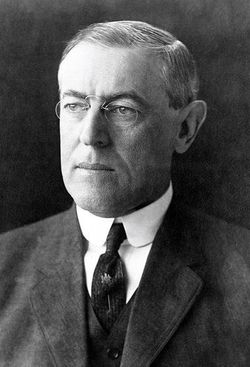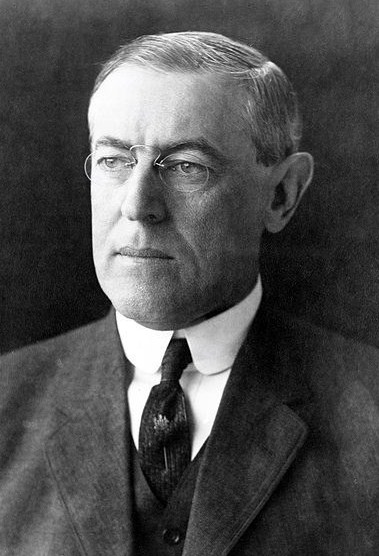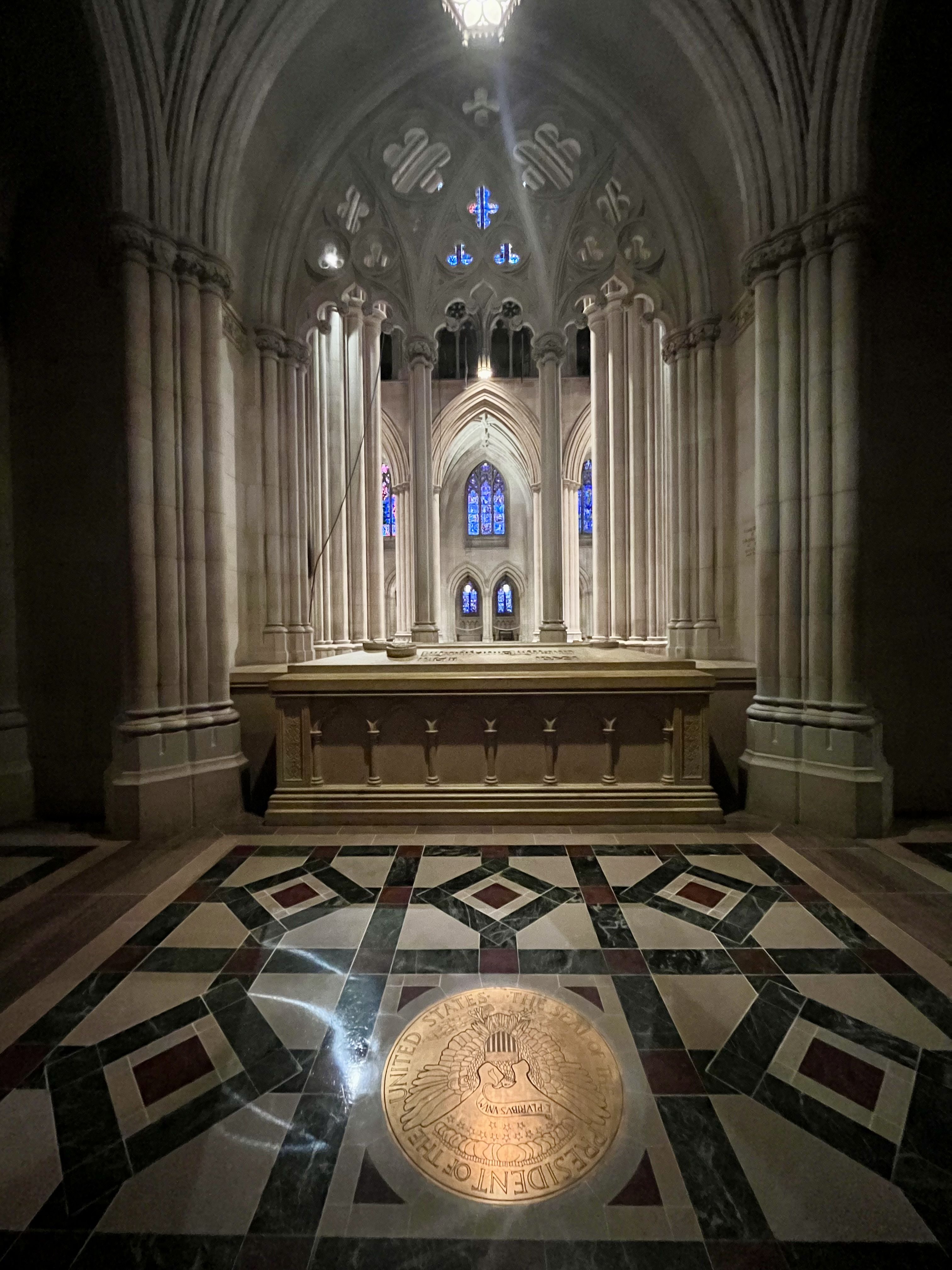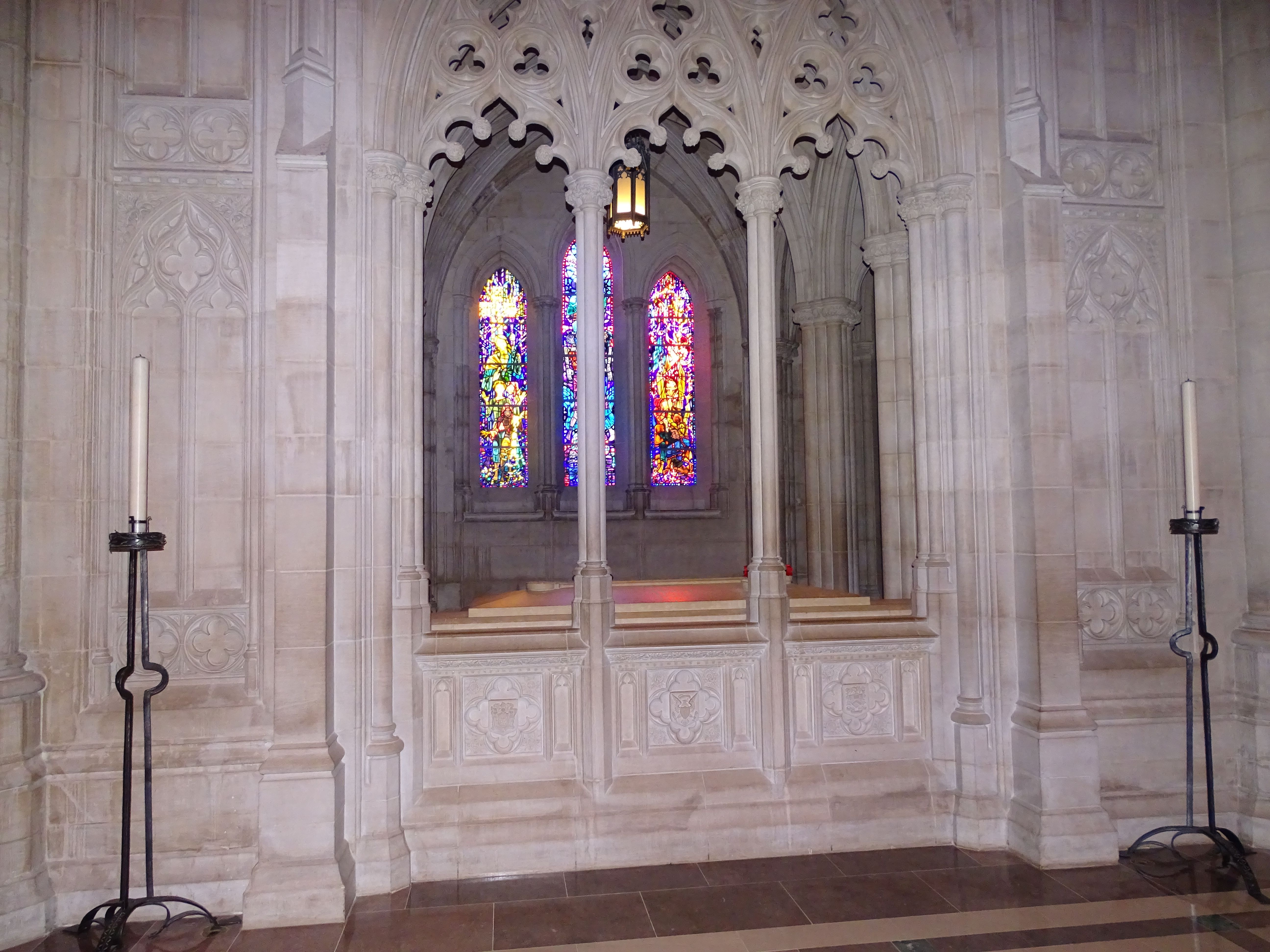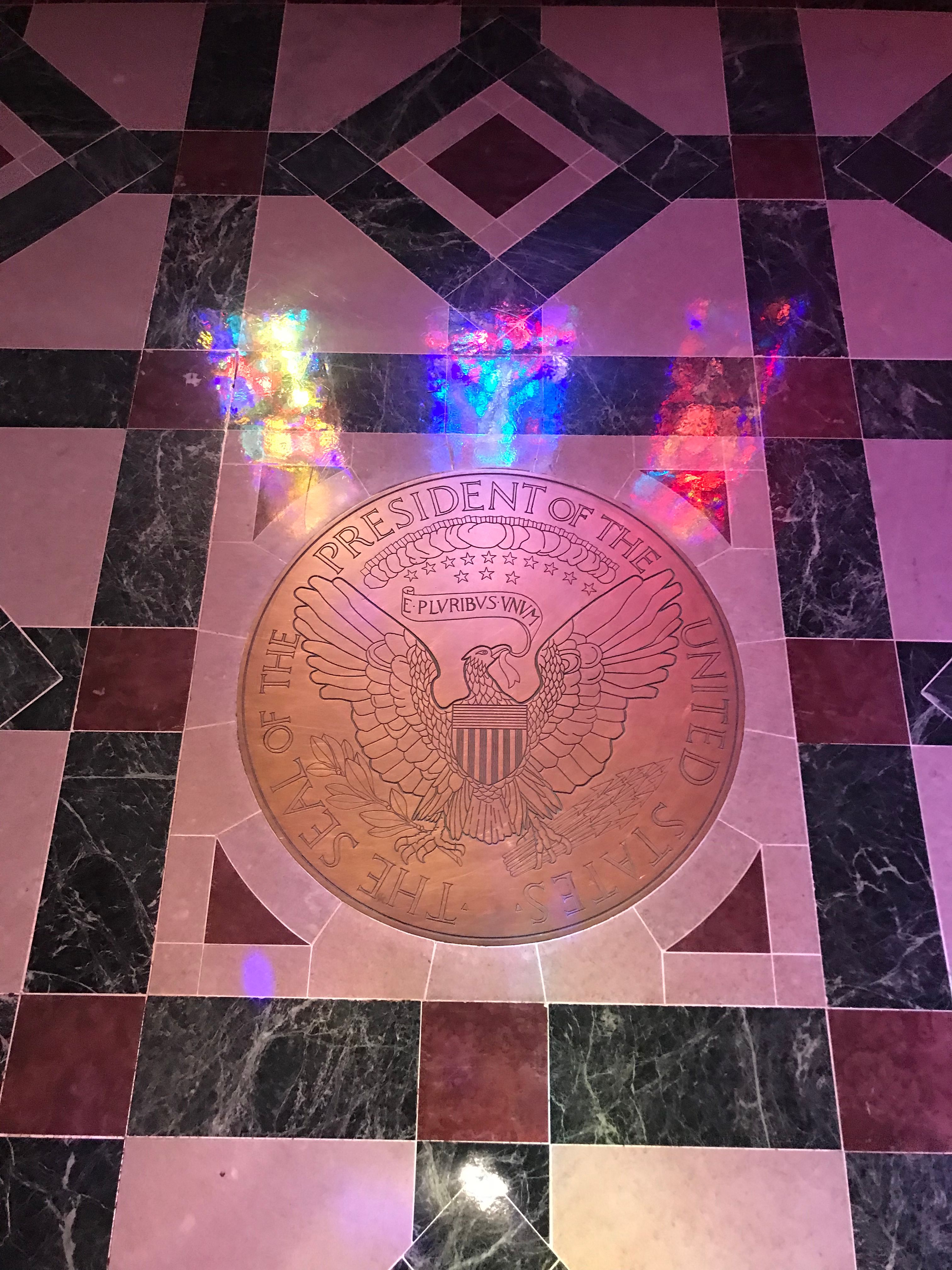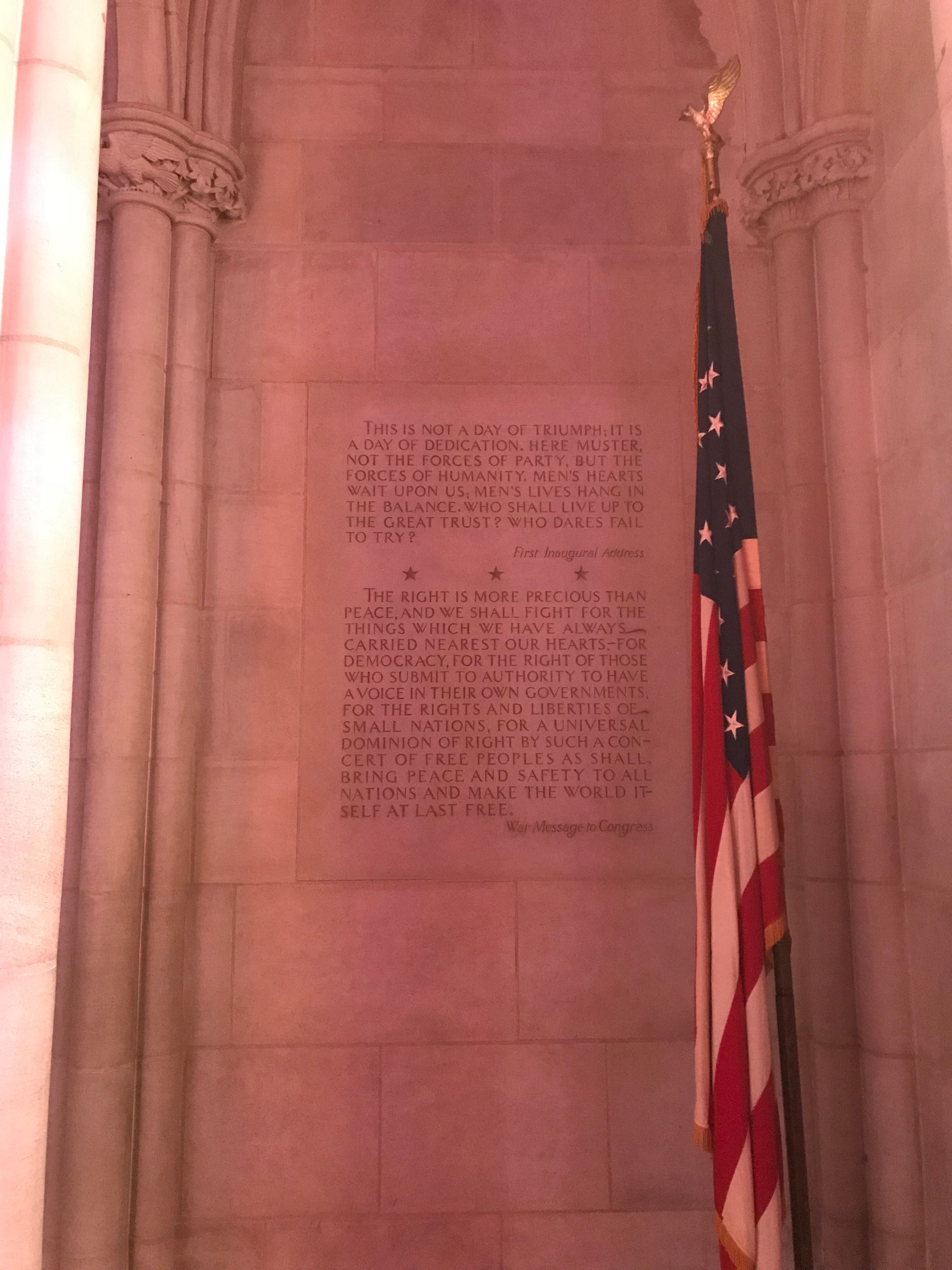28th United States President, New Jersey Governor, Nobel Peace Prize Recipient. He is best remembered for keeping America neutral at the start of World War I, but reluctantly entering the war in 1917, joining the Allied Powers, primarily Britain and France, to defeat the Central Powers led by Germany, Austria-Hungary and the Ottoman Empire, and for creating the League of Nations, intending to help preserve territorial integrity and political independence among all nations after the end of World War I. He strongly advocated antitrust laws and was a staunch supporter of voting rights for women. Born Thomas Woodrow Wilson, the son of a Southern Presbyterian minister, he did not learn to read until past the age of ten, which may have been attributed to dyslexia. As the first United States President from the Deep South since the American Civil War, he spent most of his childhood, including the war and the reconstruction years, in the racial segregated Augusta, Georgia. In 1873, he attended Davidson College near Charlotte, North Carolina for a year but did not return for health reasons. After securing a teaching position at what is now Princeton University in New Jersey, he resumed his college instruction at the university, graduating 38th of 167 students in 1879. He then attended law school for a year at the University of Virginia at Charlottesville but withdrew again for health reasons and returned to his home in Wilmington, North Carolina, and resumed his law studies. In January of 1882, he began a law practice in Atlanta, after passing the Georgia bar in October of that year. In 1883, he began studying for his doctorate in history and political science at Johns Hopkins University, completing his PhD with dissertation three years later. Two years later, he married Ellen Louise Axson, the daughter of a minister from Savannah, Georgia and by 1889, three daughters were born. An excellent lecturer, Wilson taught for three years at Bryn Mawr College in Pennsylvania and for two years at Wesleyan College in Macon, Georgia. In 1890, he joined the faculty at Princeton University as a professor of jurisprudence and political economy and in 1902, the university trustees promoted him to the position of president. During this time, he was able to secure additional funding for new facilities and curriculums, increased salaries, a natural history museum, and increased the faculty by more than 60. In 1910, he decided to leave his position due to ongoing social conflicts with the university trustees and alumni, and enter New Jersey State politics. He ran for state governor in 1910 as a Democrat and defeated the Republican candidate Vivian M. Lewis, becoming the 34th Governor of New Jersey. He immediately established reforms, including the establishment of state primaries, overhauled the public utility commission, and introduced worker's compensation. His popularity as governor along with the national media exposure gave him the springboard to run as the Democrat candidate for U.S. President in 1912 and he defeated the Republican incumbent President William Howard Taft in the general election. In 1913, he became the first president to deliver the State of the Union address since 1801 and held the first modern presidential press conference on March 15, 1913, that permitted reporters to ask him questions. In 1914, his wife died and the following year, he met and married Edith Bolling Galt. During his first term as President, he persuaded Congress to pass major reforms, to include the Federal Reserve Act (1913), the Underwood Tariff Act (1913), the Clayton Antitrust Act (1914), the Smith-Lever Act (1914), the Federal Farm Loan Act (1916), the Adamson Act (1916) and the Keating-Owen Act (1916). When World War I (WWI) broke out in Europe in 1914, he kept the United States neutral in the conflict, in spite of the sinking by a German submarine of the British passenger ship "RMS Lusitania" with 123 United States citizens on board in May of 1915. In 1915, he had the first silent film, "The Birth of a Nation," which was adapted from the novel "The Clansman," controversially shown at the White House. In 1916, he was renominated as the Democratic candidate for president and narrowly won the election over the Republican candidate, Charles Evans Hughes. However, with Germany's program of unrestricted submarine warfare in early 1917, coupled with their attempt to enlist Mexico as an ally against the United States, he broke from his neutrality stance, without reluctance, and asked Congress to declare war on Germany on April 2, 1917, which happened two days later. He pushed for passage of the Espionage Act (1917) and the Sedition Act (1918) to suppress opposition to the war at home. Additionally, the passage of the Immigration Act (1918) gave him further powers to deport foreign immigrants, who opposed America's participation in the war. After Germany surrendered on November 11, 1918, he traveled to Paris for the Peace Conference, spending six months there to help develop the Treaty of Versailles. His idea of the League of Nations, which was made famous in his "Fourteen Points" address to Congress on January 8, 1918, was incorporated into the treaty and he was awarded the 1919 Nobel Peace Prize for his efforts. After returning to the U.S., he began a stressful cross-country speaking tour in September of 1919 to elicit support for the treaty. After a speech in Pueblo, Colorado, on September 25, 1919, he collapsed and a week later suffered a cerebral hemorrhage from the effects of which he never fully recovered. Returning to the White House, he was an invalid for the rest of his term and, with few exceptions, his wife closely monitored and controlled his actions. His wife isolated him from the Vice President, his cabinet, Congressional visitors, along with editing any newspaper releases on his health. The Treaty of Versailles was never ratified by Congress and the U.S. never joined the League of Nations. After his second presidential term was over, he maintained his residence in Washington, D.C. Echoing his well-publicized segregationist stance, he was a prolific author including the five-volume text "A History of the American People" and the six-volume "The Papers of Woodrow Wilson." For his reasoning of racial segregation, his name was removed in the 21st century from various buildings including Princeton University. He died at the age of 67 and is the only U.S. President to have been buried in Washington, D.C.
28th United States President, New Jersey Governor, Nobel Peace Prize Recipient. He is best remembered for keeping America neutral at the start of World War I, but reluctantly entering the war in 1917, joining the Allied Powers, primarily Britain and France, to defeat the Central Powers led by Germany, Austria-Hungary and the Ottoman Empire, and for creating the League of Nations, intending to help preserve territorial integrity and political independence among all nations after the end of World War I. He strongly advocated antitrust laws and was a staunch supporter of voting rights for women. Born Thomas Woodrow Wilson, the son of a Southern Presbyterian minister, he did not learn to read until past the age of ten, which may have been attributed to dyslexia. As the first United States President from the Deep South since the American Civil War, he spent most of his childhood, including the war and the reconstruction years, in the racial segregated Augusta, Georgia. In 1873, he attended Davidson College near Charlotte, North Carolina for a year but did not return for health reasons. After securing a teaching position at what is now Princeton University in New Jersey, he resumed his college instruction at the university, graduating 38th of 167 students in 1879. He then attended law school for a year at the University of Virginia at Charlottesville but withdrew again for health reasons and returned to his home in Wilmington, North Carolina, and resumed his law studies. In January of 1882, he began a law practice in Atlanta, after passing the Georgia bar in October of that year. In 1883, he began studying for his doctorate in history and political science at Johns Hopkins University, completing his PhD with dissertation three years later. Two years later, he married Ellen Louise Axson, the daughter of a minister from Savannah, Georgia and by 1889, three daughters were born. An excellent lecturer, Wilson taught for three years at Bryn Mawr College in Pennsylvania and for two years at Wesleyan College in Macon, Georgia. In 1890, he joined the faculty at Princeton University as a professor of jurisprudence and political economy and in 1902, the university trustees promoted him to the position of president. During this time, he was able to secure additional funding for new facilities and curriculums, increased salaries, a natural history museum, and increased the faculty by more than 60. In 1910, he decided to leave his position due to ongoing social conflicts with the university trustees and alumni, and enter New Jersey State politics. He ran for state governor in 1910 as a Democrat and defeated the Republican candidate Vivian M. Lewis, becoming the 34th Governor of New Jersey. He immediately established reforms, including the establishment of state primaries, overhauled the public utility commission, and introduced worker's compensation. His popularity as governor along with the national media exposure gave him the springboard to run as the Democrat candidate for U.S. President in 1912 and he defeated the Republican incumbent President William Howard Taft in the general election. In 1913, he became the first president to deliver the State of the Union address since 1801 and held the first modern presidential press conference on March 15, 1913, that permitted reporters to ask him questions. In 1914, his wife died and the following year, he met and married Edith Bolling Galt. During his first term as President, he persuaded Congress to pass major reforms, to include the Federal Reserve Act (1913), the Underwood Tariff Act (1913), the Clayton Antitrust Act (1914), the Smith-Lever Act (1914), the Federal Farm Loan Act (1916), the Adamson Act (1916) and the Keating-Owen Act (1916). When World War I (WWI) broke out in Europe in 1914, he kept the United States neutral in the conflict, in spite of the sinking by a German submarine of the British passenger ship "RMS Lusitania" with 123 United States citizens on board in May of 1915. In 1915, he had the first silent film, "The Birth of a Nation," which was adapted from the novel "The Clansman," controversially shown at the White House. In 1916, he was renominated as the Democratic candidate for president and narrowly won the election over the Republican candidate, Charles Evans Hughes. However, with Germany's program of unrestricted submarine warfare in early 1917, coupled with their attempt to enlist Mexico as an ally against the United States, he broke from his neutrality stance, without reluctance, and asked Congress to declare war on Germany on April 2, 1917, which happened two days later. He pushed for passage of the Espionage Act (1917) and the Sedition Act (1918) to suppress opposition to the war at home. Additionally, the passage of the Immigration Act (1918) gave him further powers to deport foreign immigrants, who opposed America's participation in the war. After Germany surrendered on November 11, 1918, he traveled to Paris for the Peace Conference, spending six months there to help develop the Treaty of Versailles. His idea of the League of Nations, which was made famous in his "Fourteen Points" address to Congress on January 8, 1918, was incorporated into the treaty and he was awarded the 1919 Nobel Peace Prize for his efforts. After returning to the U.S., he began a stressful cross-country speaking tour in September of 1919 to elicit support for the treaty. After a speech in Pueblo, Colorado, on September 25, 1919, he collapsed and a week later suffered a cerebral hemorrhage from the effects of which he never fully recovered. Returning to the White House, he was an invalid for the rest of his term and, with few exceptions, his wife closely monitored and controlled his actions. His wife isolated him from the Vice President, his cabinet, Congressional visitors, along with editing any newspaper releases on his health. The Treaty of Versailles was never ratified by Congress and the U.S. never joined the League of Nations. After his second presidential term was over, he maintained his residence in Washington, D.C. Echoing his well-publicized segregationist stance, he was a prolific author including the five-volume text "A History of the American People" and the six-volume "The Papers of Woodrow Wilson." For his reasoning of racial segregation, his name was removed in the 21st century from various buildings including Princeton University. He died at the age of 67 and is the only U.S. President to have been buried in Washington, D.C.
Bio by: William Bjornstad
Family Members
Advertisement
See more Wilson memorials in:
Records on Ancestry
Sponsored by Ancestry
Advertisement
